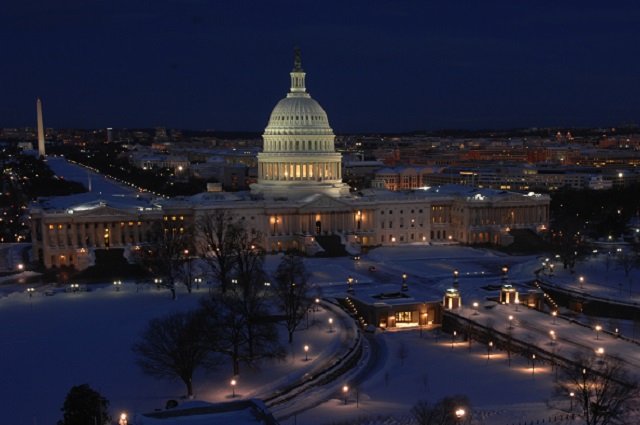News Story
(Below is a backup copy of the original article with as much credit to the publisher as well as the author that we can provide. By no means do we mean to violate any copyright laws. This page is appearing because someone indicated that the original story was unavailable.)
As Florida’s DeSantis roars ‘Onward, Christian soldiers!’ Democrats must get real about religion | Editorial
Is America a Christian nation? The United States is a secular nation with no official religion, so the answer is No. But to Republicans such as Florida Gov. DeSantis, simplifying the answer to a Yes is a powerful tool. They’ve found a political gold mine in pitting Christians against the so-called evils of the left, gay and transgender people and teachers accused of pushing a “woke” agenda. DeSantis’ flirting with Christian nationalism — the belief that America is in God’s plan and was intended to be a Christian nation — as the Herald recently reported, is not new in GOP politics. But it shows where the governor’s mind is. Elected in 2018 by a razor-thin margin in a state long considered purple — Florida has become redder, but it isn’t Mississippi, yet — he appears more concerned with 2024 GOP presidential primary voters. He’s not losing any sleep over alienating middle-of-the-road voters in his state. TOP VIDEOS × But there’s something else to which the other side of the aisle should pay attention. NO COINCIDENCE It doesn’t seem like a coincidence that, at the same time the GOP ramps up its rhetoric on religious and culture wars, the party makes gains with Hispanic and non-white voters in places like Miami-Dade. Get unlimited digital access Subscribe now for just $2 for 2 months. CLAIM OFFER That seems like a contradiction given that Donald Trump based his campaign on anti-immigrant and anti-”other” sentiment. But many of those groups share traditional values espoused by the GOP, religious values being one of them. When religious voters say they feel shamed for talking about God, they should not be derisively dismissed as Bible-thumpers. Democrats have yet to come up with with an effective counter-narrative to DeSantis’ use of war imagery to talk about religion. “Put on the full armor of God. Stand firm against the left’s schemes,” DeSantis told an audience at Michigan-based Christian Hillsdale College. Yes, Democrats appear in some church pulpits to rally their base during election season, and high-profile politicians like President Biden, who’s Catholic, have been open about their faith. But given the onslaught of religious talk in Florida — and the use of government to promote one conservative religious view — Democrats must find a better way to acknowledge the importance of religion and spirituality in people’s lives without crossing the line into proselytizing. If DeSantis is telling his followers to go fight to shape the nation to their religious liking, the counter-narrative should be that this rhetoric could not only incite violence, but it also undermines Christianity itself. For most Christians, religion doesn’t mean hostility toward your fellowmen and those who share different beliefs, as DeSantis makes it seem. Religion has always been a sticky subject for the left. The Democratic Party has served as a big tent for Catholics, Protestants, religiously unaffiliated people, Jews, Muslims, voters of other religions, atheists and agnostics. While the GOP has been the party of mostly white Christians, Democrats “have been the party of everyone else,” and they can’t “hit the same note time and time again,” said Ryan Burge, an Eastern Illinois University professor who studies the intersection between religion and political behavior. THE APPEAL The secularization of America presents challenges to DeSantis’ strategy in the long run. But, as Burge explained, Christian nationalism isn’t appealing only because of religion. To some, it’s nostalgia for the days when traditional values weren’t questioned, when “a woman was a woman and a man was a man,” to quote a common conservative grievance. It’s resistance in the face of the excesses of identity politics, which DeSantis skillfully mislabeled “woke” culture. There’s a big difference between a leader turning to faith to guide their decisions and turning the state into the vehicle to advance one religious point of view. When the latter happens, the result is often to exclude people who don’t fit the mold. We cannot overlook the overlap between Christian nationalism — and its nostalgia for our “Anglo-Protestant” past — and white supremacy. Many devout Christians enslaved Black people in centuries past. This brings us to present-day data, cited in The New Yorker magazine, that, according to Robert P. Jones, head of the Public Religion Research Institute, a nonpartisan polling and research group, “The more racist attitudes a person holds, the more likely he or she is to identify as a white Christian.” DeSantis and other conservative leaders are trying to erode the separation of church and state, a concept Thomas Jefferson wrote of in an 1802 letter and cited in landmark court rulings. Florida taxpayers are now paying for training sessions for public school teachers that deny the Founding Fathers wanted that separation. The Founding Fathers had very nuanced views about religion, as the Herald Editorial Board previously explained. DeSantis is not alone in this. The majority-conservative U.S. Supreme Court chipped away at that wall of separation with a series of recent rulings. With Evangelicals proving to be such an important and faithful voting bloc for Trump, there’s incentive for our ambitious and savvy governor to continue to court them. Whereas the governor’s Christian nationalist shtick only separates us, the Democrats need to counter it more boldly and bring back into their tent voters who feel that, on the issues of religion and faith, the party has nothing to say to them.
Read more at: https://www.miamiherald.com/opinion/editorials/article265851981.html#storylink=cpy

